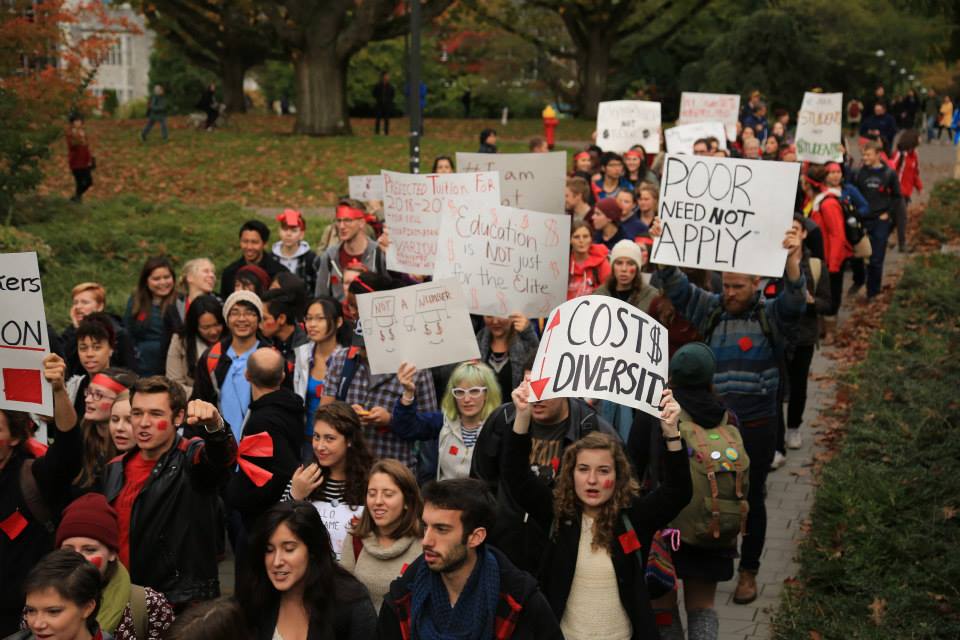There’s a revolution happening at the University of British Columbia this semester. Earlier this month the UBC administration announced a set of proposals to increase tuition on incoming international students by 10 per cent and jack up residence fees on eight-month housing contracts by 20 per cent effective September 2015. The outraged response to this was almost immediate, with students coming together in large numbers to get informed and protest the university’s plans.
Students learned of the proposals after the student association leaked a presentation they had been given by the university administration. In the presentation, which is an overall testament to the corporatization of the contemporary university, administrators argued that UBC has “fallen behind” on international tuition rates and thus needs to catch up by scavenging more funds off international students, who already pay about four times as much as domestic students for most undergraduate programs.
The argument for increasing residence fees followed in a similar Ayn Rand-esque vein: that UBC rates are not as high as market housing rates in Vancouver and as such should be increased with no time to spare. The methodology for UBC’s survey to determine these “market rates” has been widely called into question as the survey was entirely voluntary and the results do not seem to reflect the accurate experiences of students searching for local housing.
The governing body that will make the final decision on the proposed increases is the UBC Board of Governors (BOG), a set of individuals that are mostly appointed by the provincial government, save a handful of elected student, staff, and faculty representatives who do not have a majority voting bloc. Students in particular only have three representatives on the 19-person board. UBC sits on unceded Musqueam land. Because these lands do not technically qualify as Vancouver, students who live on campus are unable to vote in Vancouver municipal elections.
Because the BOG has sole jurisdiction over UBC land, and due to an absence of any policies that safeguard student tenants, the Board is not required to consult with students at all on the subject of residence fee hikes. There is a necessary consultation process for the tuition increases, but it has been widely decried as bogus by student activists and poorly attended.
In the words of student organizer Ivan Leonce: “Is it really a democratic consultation process when the university has already decided what the problem is (that we’re behind on charging our students), how they’re going to fix it (increase student fees) and exactly how long it is going to take them to convince us that they’re right (30 days)?”.
To date, UBC has not sent a single email to students about the hikes or the consultation dates. Administrators have also changed the consultation days on short notice and scheduled them at dates and times when students are unlikely to attend — the next Town Hall is scheduled to take place on Hallowe’en.
Often decried as a university with little to no activist base, the UBC student body has acted forcefully against the proposals. A coalition of students operating under the moniker #IAmAStudent (word play off of UBC’s official hashtag #IAmUBC) have organized a series of events that included a Teach-In, a General Assembly, and a protest.
The peaceful Teach-In was attended by around 300 students and featured a wide range of speakers that included Urban Studies department chair Dr. Elvin Wyly, and student representatives from campus groups such as the anti-racist organization Colour Connected Against Racism, the International Students Association, and the Residence Hall Association. The General Assembly had a similar turnout and saw students come together for broad open discussions about next steps. Around 250 students attended the protest, which ended with several students bathing in a prominent fountain in the centre of campus and making a show of scrubbing off dollar signs they had drawn onto their bodies.
The most recent student action occurred earlier this week on October 28 when the #IAmAStudent coalition mobilized students to attend the Annual General Meeting (AGM) of UBC’s student association, the Alma Mater Society (AMS). Due to their mobilizing efforts the AGM was attended by over 500 students, making it the first AMS AGM to reach quorum in nearly 40 years.
At the AGM, students voted on a series of motions that are now binding on the AMS. Most notably, students voted overwhelmingly in favour of the AMS lobbying provincial governments for increased post-secondary funding and for the creation of an independent body to advocate for the rights of student tenants. The AMS is also required now to support (financially and resource-wise) student groups that are organizing against the tuition increases and also to organize its own student protests against the hikes.
Mobilization of this size is uncommon at UBC and, as student Gab D’Astous said during his speech at the teach-in, “this is just the beginning.”
Alex Mierke-Zatwarnicki is a local student activist and a founding editor of The Talon, UBC’s new alternative student press.
Image: Tobias Klenze/Public Domain



